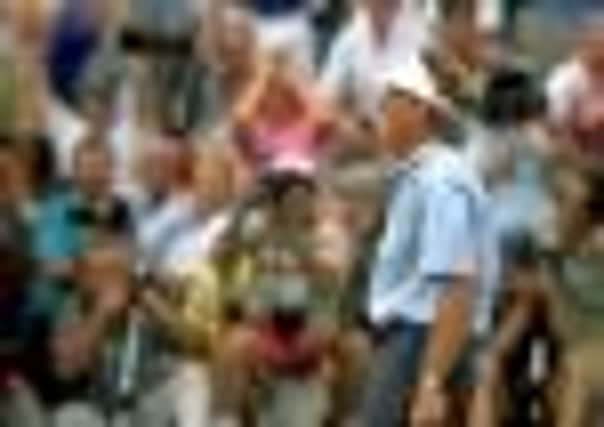From the archive: Europe lose by half a point to US as Ryder Cup goes down to the wire


ONCE the eyes had adjusted to the sustained glare of Stars and Stripes which attended the American victory in the 29th Ryder Cup match, it became possible to peer through all the emotion and get things into some sort of reasonable perspective.
So highly charged has the event become that nobody seems merely to lose anymore. Losing – an inescapable and inevitable part of any sport – is classed as “failure’’ which, in the case of the European side who competed so valiantly at Kiawah Island, it patently was not.
Advertisement
Hide AdAdvertisement
Hide AdIt is not failure to travel to the US, play a side comprising some of the finest golfers in the world and lose by half a point out of 28 on the last hole of the last match of three days’ intensive competition over a golf course which – no matter what Dave Stockton may say – is about as “British’’ as cherry soda. Neither does Bernhard Langer deserve to be associated with failure. Talking of that malignant six-footer which got away from the German and settled the issue, Seve Ballesteros said: ‘’Nobody could fault Langer. Nobody could have made that putt – not me, not Jack Nicklaus in his heyday.’’
Bernard Gallacher, the European team captain, had said much the same thing at the presentation ceremony. Not that Langer was the only one under pressure. In fact, one of the striking features of the contest was just how involved the players became.
Here were some of the arch-mercenaries of the game, sweating blood and near to tears over a trophy which doesn’t have as much as a small side-bet to its name – an anachronism in modern professional golf, a competition without a prize purse.
Hale Irwin, who played such a major role in the US success – he and Ray Floyd quite belied their years – confessed that when he’d played his bad chip at the last, he thought that was it.
No-one will ever, ever, know how I felt just at that moment,” he said. “The feeling is just indescribable. That pressure, the Ryder Cup pressure, is like nothing else. I could hardly swing the club over the last few holes.’’
The “sphincter factor’’, as he quaintly termed it, had been high. That is how Ryder Cup golf affects seasoned veterans like Irwin. The Europeans fielded five newcomers to the scene, and it was a tribute to the quality of the European Tour that the side performed as they did.
David Gilford had an unhappy baptism, one way and another, but foursomes golf, with its nervy alternate-shot format, does not aid the development of a playing rhythm in the best of circumstances. In the context of someone’s first Ryder Cup it can be demoralising. Gilford was desolate when told he was dropping out of the singles in accordance with captain’s agreed procedure in the event of a withdrawal – in this case, America’s Steve Pate. On that subject, Colin Montgomerie suggested there were doubts in the European camp about the decision, coming as it did after the captains had seen the draw. ‘’We talked about it at breakfast on Sunday,’’ said the Scot when it was all over, ‘’and some of us thought there was something fishy about it. Injuries don’t suddenly get worse overnight.’’
The implication was that as Pate, whose lingering injury from Wednesday’s car crash made him the most vulnerable American, was down to play Ballesteros, an opportunity might have been seized to remove him from the line of fire and secure a half-point from the cancelled match and let Wayne Levi take his chances with the Spaniard. It also meant that while the European complement of first-time players in the singles was reduced to four, the US now only had two debutants on parade as the crunch drew nigh. As it turned out, a half-point was all that stood between the Europeans and their retention of the Cup, but all that is hypothetical and irrelevant now.
Advertisement
Hide AdAdvertisement
Hide AdGallacher made a great impression at Kiawah and carried off the job with style, dignity, humour and refreshing directness. He was noncommital about the future, but as Ken Schofield, the executive director of the European Tour, pointed out, the plan was that Gallacher would captain both the 1991 and 1993 teams. In the course of reviewing the match, Gallacher gently pointed out that Ryder Cup captains do not operate with the benefit of hindsight. It was a good point and he’d have had to be psychic to guess that the trouble wasn’t going to come from his new boys, but from two of his anchormen.
Ian Woosnam, the world number one, and Nick Faldo collected two points between them. Their eclipse only served to highlight the worth of the contributions made by Ballesteros and Jose Maria Olazabal and the first-time men – David Feherty, slayer of Payne Stewart in the singles, who slotted a memorable putt to snatch a half in the first-day four-ball in which he played with Sam Torrance; Steven Richardson, who collected two points in partnership with Mark James; Montgomerie, who won in four-ball tandem with Langer before cashing in on Sunday with a half against Mark Calcavecchia; and, as impressive as any, Paul Broadhurst, who emerged with a 100 per cent record – a win with Woosnam over Paul Azinger and Pate in the Saturday four-ball and a victory over Mark O’Meara in the singles.